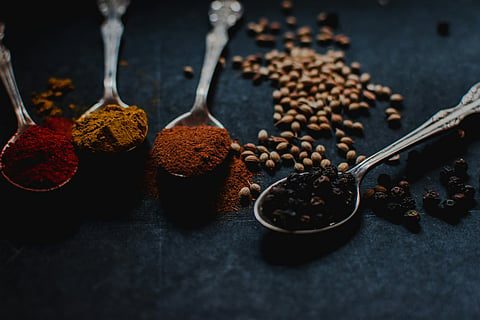
- LIFESTYLE
- FASHION
- FOOD
- ENTERTAINMENT
- EVENTS
- CULTURE
- VIDEOS
- WEB STORIES
- GALLERIES
- GADGETS
- CAR & BIKE
- SOCIETY
- TRAVEL
- NORTH EAST
- INDULGE CONNECT

India, a land of vibrant flavours and rich culinary heritage, is renowned for its exquisite use of spices. What truly sets Indian cuisine apart is the generous infusion of aromatic herbs and spices, each carrying a legacy of history, tradition, and healing properties. These treasured ingredients have graced Indian kitchens for centuries, elevating simple meals into extraordinary feasts of flavor and fragrance.
Beyond their ability to tantalise the taste buds, spices play a profound role in shaping the essence of Indian cooking. Turmeric, the golden elixir, brings warmth and wellness; cardamom and cinnamon lend a touch of sweet mystique; while cumin and coriander weave earthy depth into every dish. Each spice tells a story, passed down through generations, binding families with the familiar scents of home-cooked meals.
1) Aids digestion: Some spices work wonders for your gut health. They help in reducing bloating, enhancing nutrient absorption, and stimulating digestive enzymes.
2) Boosts immunity: Indian spices are rich in antioxidants and anti-inflammatory compounds, which fortify the immune system and help combat infections.
3) Supports heart health: Indian spices support heart health by lowering bad cholesterol, improving circulation, and reducing inflammation. Cinnamon and garlic help regulate blood pressure, while turmeric and ginger prevent arterial plaque buildup. Fenugreek and cumin aid in blood sugar control, reducing heart disease risk. Adding these spices to your diet naturally promotes cardiovascular wellness.
4) Provide glowing skin and healthy hair: Herbs offer numerous health benefits, enhancing both physical and mental well-being. They boost immunity with antioxidants, aid digestion by promoting gut health, and reduce inflammation, helping with pain relief. Many herbs also support heart health by improving circulation and lowering cholesterol. Some, like ashwagandha and tulsi, reduce stress and anxiety, while others, such as neem and aloe vera, promote glowing skin and healthy hair.